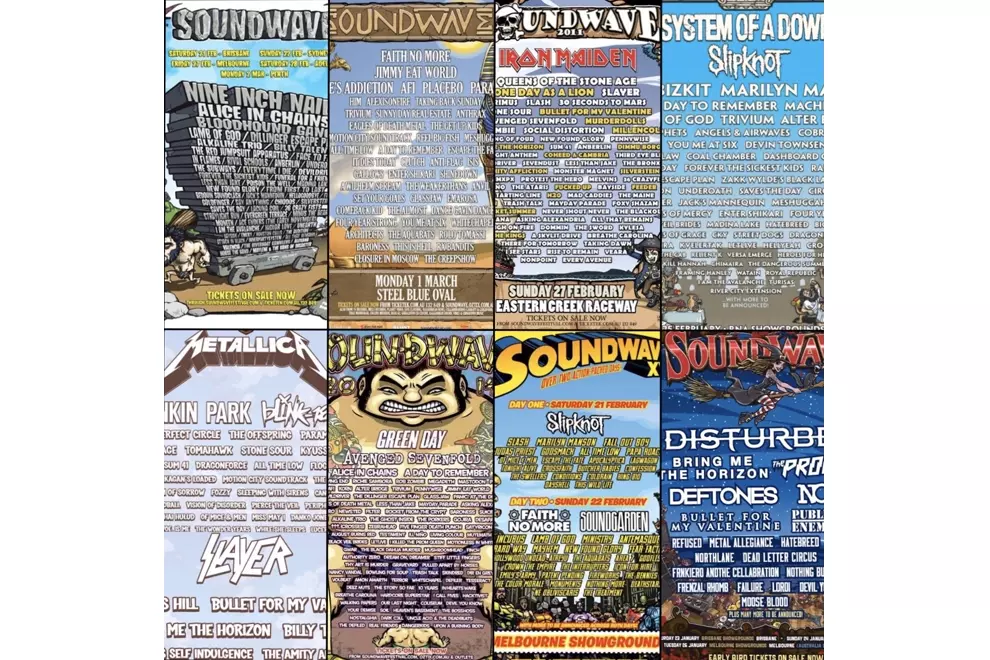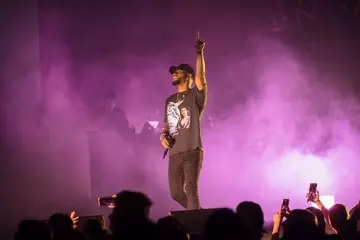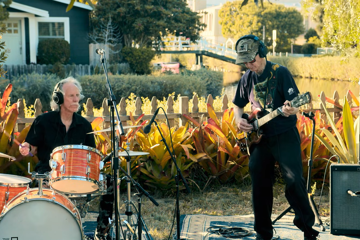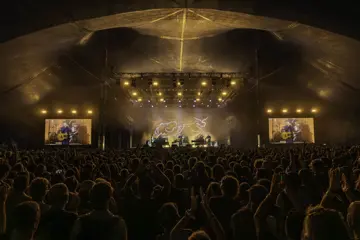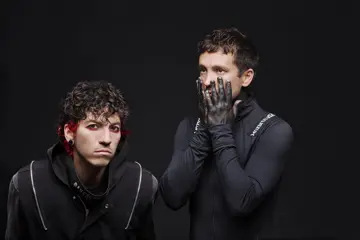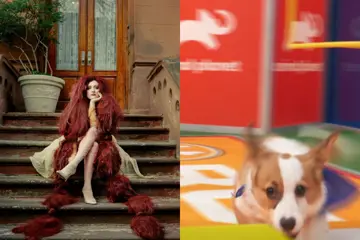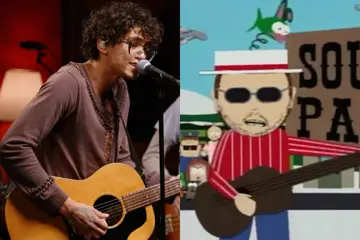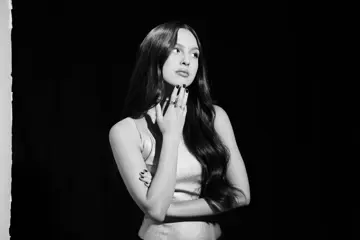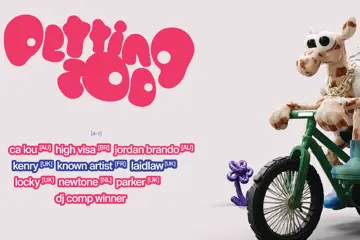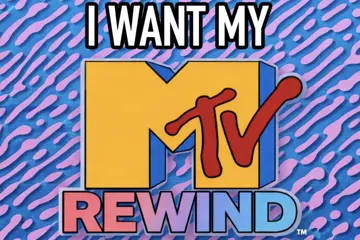For many years, from 2008 till 2015, the February-March period held one of the most anticipated live events of the calendar year for Australian heavy music lovers. Well before Good Things, before Unify Gathering was happening every January down in South Gippsland, and long before Download Festival in Australia was even an idea, and rivaling that of Big Day Out, there was Soundwave Festival.
2005-2008: the early days
Soundwave first began in Perth, originally known as Gravity Soundwave, held within the larger, Vodaphone corporate-sponsored, water and action sporting event, Gravity Games. What we now know as Soundwave started in 2004, with Good Charlotte technically being the first-ever headline act of what would very soon become Australia's biggest alternative/heavy music fest, performing alongside Gyroscope and One Dollar Short. A second night of punk rock followed that year, featuring Soundwave-regulars Unwritten Law, Regurgitator, MxPx, and punk legends Lagwagon. In 2005, the festival was held in October, headlined by Grinspoon, Unwritten Law returning, also including Reel Big Fish, and Goldfinger. The third and final year of the Gravity Games in 2006 went off with Aiden, Gyroscope once again, Kisschasy, a totally unknown metalcore band called Parkway Drive, as well as a then-budding, post-hardcore group called The Getaway Plan, pre their city-meeting-the-sea successes.
After those humble beginnings, 2007 and 2008 saw the festival jump beyond its Western Australia state lines, and into its own budding business. This meant more dates, more cities, having more stages and also securing bigger rock artists like Deftones, +44, Incubus and The Offspring to headline. The only other event that was in the same ballpark as Soundwave was Big Day Out, which sadly wasn't long for this world nor was it catering to punk and hardcore as much. It was only up for Soundwave from here.
2009; arguably the first big one.
Soundwave was not the first Australian festival for rock and metal circles, and it would not be the last, but by its fifth year operating, it had grown exceptionally. With a whopping 55 bands over six stages, 2009 was perhaps the first big Soundwave that put it on the map; something crucial that they could - and would - build upon. This was the promoter capitalizing so well on their roots, garnering positive national and international press coverage. 2009 was the year that Soundwave first became a blip on my own personal radar, reading a glowing live review of it within the pages of Rock Sound, highlighting great sets from Alkaline Trio, Poison The Well, Nine Inch Nails, Underoath and Every Time I Die. Reading that, seeing these photos, and suddenly realizing that there was such a festival, full of bands that I liked, happening mere hours away from me each year blew my teenage mind apart.
2010; my first one.
Don't miss a beat with our FREE daily newsletter
Soundwave's class of 2010 was the first year that I personally attended, and it remains to this day as one of the best days of my youth. Scoring a ticket just to see My Chemical Romance live - who'd later pull out due to Gerard Way's vocal issues (yes I was gutted), getting fittingly replaced by their alt-rock peers, Jimmy Eat World - it was a whos-who of my listening tastes spread out over an awesome, long ten-hour day. And I'm 110% confident that I'm not alone in that sentiment, for as this festival grew and expanded, so too did its age and listening demographics, becoming a touchstone moment for so many eager fans.
I remember that day so clearly. Seeing Architects play nearly all of 'Hollow Crown' in full inside that ball-sweltering sheep-shearing shed was special. Watching Paramore at what was arguably their peak during the 'Brand New Eyes' cycle (still their best album), and them immediately afterward, being wowed by AFI's hour-long masterful set, cementing them as one of alt-rock's best live acts to this day. Catching a bubbly Taking Back Sunday performing pop-punk hit after pop-punk hit on the main-stage under the hot early afternoon sun was bliss, as was watching Alexisonfire kill it later on, a year and a half before their shocking announcement of calling it quits. (For a good five years, anyway.) To winding down with the fun easycore of Four Year Strong, before capping it off with a blistering, chaotic set from Enter Shikari, I'll never forget the experience of that day. This turn of the decade was when Soundwave broke through to become a powerhouse festival, one full of possibility that we'd all like to only remember it as such.
[caption id="attachment_1109051" align="aligncenter" width="760"] Paramore, Sydney, 2010. [/caption]
Paramore, Sydney, 2010. [/caption]
2011; another big win!
Iron Maiden, 30 Seconds To Mars, Bullet For My Valentine, Zebrahead, The Gaslight Anthem, 36 Crazyfists, Bring Me The Horizon, Primus, and Millencolin bolstered the mighty 2011 bill, rounded out by smaller yet stellar acts like Polar Bear Club, Veara, The Blackout, Fucked Up, The Amity Affliction (for the time). It made for a great mix. Because it wasn't just the variety of old and new metal, hardcore, pop-punk, emo, alt-rock, and the occasional hip-hop/rap-leaning group that made Soundwave stand out; it was the diversity between the younger and veteran bands; giving time to young Aussie local acts, the odd Japanese band, as well as the rare black metal group too.
Being on-ground that year, it felt like such an event could never end. You could see that things were only getting bigger in terms of stages, sites, high-profile names, and crowds. There was no end to its scope. It was getting better, making Soundwave a prime festival for locals and internationals, and it's about this point that I really remember meeting more Europeans and Americans traveling Down Under for it. Let's not be coy; Soundwave was rapidly growing into a house-hold festival name, standing proud alongside that of Sonisphere, Download, Big Day Out, and so on. Years like 2011 were building it up to a glorious height that seemingly knew no limit.
[caption id="attachment_1109048" align="aligncenter" width="760"] Devildriver, 2011. [/caption]
Devildriver, 2011. [/caption]
2012; too big to fail?
If it's starting to feel like with each new year we're rolling through, I'm just listing off big bands from around the world, that's because that's what Soundwave accomplished so well in its existence: scoring relevant names and smaller artists alike, exposing both of those popular extremes to hordes of music lovers around Australia each year. As for the day itself, seeing Thursday during their final Aussie run (lol) was wonderful, as was catching Underoath live before they disbanded for a couple of years. (I'm really noticing a pattern with all of these bands.) And of course, watching the absolute trainwreck of Marilyn Manson's late-arvo main-stage set still gives me a good laugh even now.
Across its history, 2012 featured one of the Soundwave's biggest double-whammy headliners: Slipknot followed up by System Of A Down. To this day, that remains one of the festival's strongest back-to-backs. Clashing The 9 and SOAD would be heresy, unthinkable, and having these two incredibly popular rock/nu-metal bands after each other was a stroke of genius. It's moments like that where it all seemed like it'd last forever; like it was the wild west of music festivals; like it was too big to fail.
[caption id="attachment_1109049" align="aligncenter" width="760"] The Dillinger Escape Plan, 2012. PC: Kane Hibberd. [/caption]
The Dillinger Escape Plan, 2012. PC: Kane Hibberd. [/caption]
2013; somehow, a new level was reached.
Looking back on it now, the line-up for Soundwave MMXIII looks like one of those fake, wish-list bills that over-excited fans mockup in under 30 minutes on Photoshop for the likes of Coachella or Reading & Leeds. But no, it was real, and my good lord was it BIG! Slayer, Periphery, Stone Sour, Anthrax, Bring Me The Horizon, Bullet For My Valentine, The Wonder Years, Gallows, All Time Low, Dragonforce, Paramore, Cypress Hill, Blink-182, A Perfect Circle, Garbage, and even Linkin Park, all topped off by the one and only Metallica. 2013 was a new level of massive, budget-busting booking for Soundwave. It was bigger and better than ever.
It was a "go big or go home" moment, and the promoters really went for it, going as big as possible. Switching out some of its venues, like moving from Melbourne Showgrounds down to Flemington Racecourse just next door, things hit a new peak. 2013 is one of my favourite Soundwave years, just for how unbelievably stacked it was, yet it was also the festival's last year void of worries or concerns. Because the bigger climb, the harder the fall.
[caption id="attachment_1109053" align="aligncenter" width="760"] Linkin Park, Sydney, 2013. RIP Chester. [/caption]
Linkin Park, Sydney, 2013. RIP Chester. [/caption]
2014; the buck is about to stop.
Headlined by Green Day, 2014 is a bit of a special one for me. Originally not planning to attend due to my own money woes - meaning I was flat broke - my now-fiancé surprised me with a ticket before they got snapped up and scalpers swooped in. (Love you forever, Morgan.) Avenged Sevenfold, Suicide Silence, Biffy Clyro, The Ghost Inside, Thy Art Is Murder, Panic! At The Disco, A Day To Remember, and plenty of returning faces like AFI, Pennywise, Alice In Chains, Less Than Jake, and Asking Alexandria made up 2014's big-ass bill. At this point, Soundwave was still on top, baby! I mean, nothing could stop this gravy train, right? Yet as we all later learned, Soundwave 2014 was the year where some doubt was put on the promoting company, with the Perth date not doing well; a small yet contributing factor that would later lead them toward becoming insolvent and broke. It would later bring about a dire straits situation of lower ticket sales - whether down to people not enjoying the lineups anymore, as things noticeably became more mainstream in pop-punk and rock, or a weakening Aussie dollar - and poor financial moves that wouldn't dominate music media headlines till late 2015. But things forged onward.
[caption id="attachment_1109050" align="aligncenter" width="760"] AFI, 2014. PC: Griffin Rocks Photography. [/caption]
AFI, 2014. PC: Griffin Rocks Photography. [/caption]
2015; a great yet unknowing swansong.
With their biggest list of bands yet, Soundwave 2015 was split into a mammoth two days. I still remember how exhausted I was after that huge weekend; the giant crowds, unbearably sore feet, sheer volume of sweat, ringing ears, and the chafe. My god, the chafing. But it was a great year, even with the mighty task of it now being two days. Witnessing Melbourne Triple J Unearthed winners, I, Valiance, pulling a huge early day crowd before 1 pm and getting a wall of death going was surreal; experiencing Slipknot pull out all of the stops on the first night with a colossal headliner show was beyond sick; to the second day's huge send off by New Found Glory over on stage 3. Yet none of the tens of thousands of people in attendance across that 2015's three cities down the East Coast could've guessed that it would've been the end. Because Soundwave 2015 still happened despite money issues stemming back to 2014 with Perth under-performing and a huge multi-million loss from the last Big Day Out in 2014, that Maddah/Soundwave had also come into owning.
[caption id="attachment_1109052" align="aligncenter" width="760"] Slipknot, 2015.[/caption]
Slipknot, 2015.[/caption]
2016; the end had come.
Touting a decent line-up of Disturbed, NOFX, Deftones, The Prodigy, Northlane, Bring Me The Horizon, and Public Enemy, alongside others with the usual "plus many more to be announced" tag underneath, Soundwave 2016 never got off the ground. Following the first launch announcement, bands suddenly - and perhaps oddly to many punters - expressed their condolences in not returning to Australia in 2016. Cue mass confusion as the writing on the wall suddenly became crystal clear to most: behind the scenes, all was not well at Soundwave HQ. For when debts aren't paid, creditors run out of patience, and in an industry where everyone talks, no one will do business again with those who can't pay what's owed.
It was a brewing storms of issues. There was a very real public booking miscommunication with Bring Me The Horizon; a seemingly hurriedly made, Christmas-themed festival flyer that was put out; a strange volunteer members club; BDO failing; Twitter starting to go crazy, with very little of it being in favour of Soundwave's loud, outspoken boss, AJ Maddah. Confidence in the event completely plummetted, and with worse ticket sales, it was officially canned. Then the company was liquidation, leaving behind a tower of debt.
Despite being deemed that 2016's event would be an instant sell-out, only around 20,000 tickets had been reportedly sold overall at the time that news broke about Soundwave's cancellation. That's a lot of fuckin' tickets, but not enough to meet what organizers needed. With L7 pulling out, venues reportedly not even getting booked, and Soundwave/Maddah reportedly owing over $11 million to the bands who'd played in 2015 - the biggest ones being Slipknot at 1.6 million, Smashing Pumpkins at 1.2 million, and Soundgarden with well over two million - Soundwave 2016 was dead before it even the chance to run, let alone walk. Soundwave's demise put security, stagehands, small business owners who ran stalls, truck drivers, stage-construction workers, live sound and lighting engineers, road crew, stage managers, and artists deep out of work and pocket, ending its own label, 3Wise Records as well. Moreover, it was the much smaller artists that were also deeply impacted. Like U.K. prog-metal outfit Monuments, who'd miss out around $20K, which is big money for a band of their kind.
[caption id="attachment_1109054" align="aligncenter" width="555"] AJ Maddah built up Soundwave, and it also ended on his watch.[/caption]
AJ Maddah built up Soundwave, and it also ended on his watch.[/caption]
Hindsight is 2020:
Soundwave set the bar for heavy and alternative music festivals in Australia, proving that this country could have something as big and this important for metal, hardcore and alternative music. But also have it be done so well on such a scale. It tapped into a huge market that was so hungry to see and support their favorite international rock and metal artists that were being shunned by BDO or other fests. Australian musical talent clearly wasn't a priority for Soundwave; they were looking elsewhere and abroad, and in some way, maybe that was a big part of the promoter's original success.
Everyone reading this piece will have many fond memories of Soundwave during its heyday. The insane hype that built up in the third and fourth quarter of each year as Soundwave started to drip-feed band announcements, revealing dates and locations, and those eventual massive line-up drops that were just so exciting to pour-over. And of course, to the big long days themselves, where it was full of adventure, mateship, live music, and diverse rosters of known and unknown bands. Yet we cannot nor shouldn't de-contextualize what happened. Because there are people I know in the Australian music industry, from managers and publicists, who are still bitter about it five years later: the death of Soundwave almost ruined their livelihoods. Soundwave's rise as an enterprise was seriously gargantuan, but the hard fall from atop its Ivory tower was just as impactful, kick-starting Australian music media and punters' obsession with having another big heavy festival ASAP, spawning the utter disaster that was the no-go Legion Fest and the endless wave of Facebook comments of "Don't let AJ Maddah near it!" regarding any article about a new Aussie festival potentially happening.
During its run, other ventures like No Sleep Til, Warped Tour Australia, and Counter Revolution came and went, never returning, yet Soundwave persisted. Even outliving the long-running Big Day Out after 2014. An event that had slowly distanced itself from rock, alternative and heavy music for a number of years, and a festival whose stakes Maddah purchased in order to keep the historical music event going, a move that would later gravely affect that of Soundwave, when the BDO perhaps should've been left to pass on and be a great memory. Maddah also snapped up Billy Hyde Stage Systems, another failed investment as their competition simply went elsewhere, a business that would later be sold off to the tune of $600K in order to help recoup Soundwave's millions upon millions of debt.
This is all a crazy story; a huge success story turning into an even bigger mess. Soundwave Festival's colossal impact is that of a duality: its glorious rise was a high tide that rose many ships, yet its downfall was an unprecedented end that affected many within the live Australian music industry. Now in 2020, all we have left are the many great memories but a sour taste lingers. The retrospective of what originally grew it - putting on great shows, booking great bands, boldly filling up a gap in the market - and also what ultimately killed the festival - poor financial investments and like many failed businesses, overwhelming debt. It was great while it lasted though!


